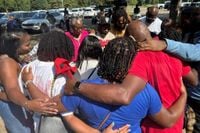On the morning of September 15, 2025, the quiet campus of Delta State University in Cleveland, Mississippi, was jolted by the tragic discovery of 21-year-old De’Martravion “Trey” Reed, a Black student from Grenada, found hanging from a tree near the university’s pickleball courts. The shocking nature of Reed’s death—and the imagery it evoked—quickly sent ripples of anguish, fear, and suspicion through the Delta State community and far beyond, stirring memories of Mississippi’s painful racial history.
According to the Cleveland Police Department, as reported by Magnolia Tribune, the Mississippi State Medical Examiner’s autopsy found the cause of death to be hanging and the manner of death as suicide. However, final toxicology results remain pending, with authorities indicating they could take two to four weeks to complete. The police also confirmed that all investigative files have been turned over to the Federal Bureau of Investigation (FBI) and the U.S. Attorney’s Office for review, underscoring the seriousness and sensitivity of the case.
Despite the initial autopsy results, emotions on campus and throughout the state have remained raw. University President Dr. Dan Ennis addressed the community’s grief and unease at a press conference, saying, “I wanna begin by acknowledging that the manner of how Trey was discovered has stirred many emotions in this community, and many emotions around the state and the nation.” He continued, “We recognize that this is not only about facts. It’s about emotions and it’s about feelings and the way this loss and how it was discovered affects people’s lives.” (WMC)
The Bolivar County Coroner’s preliminary report indicated no evidence of foul play. Still, the community’s trust has been shaken, with students and family members pressing for transparency and a thorough investigation. As Dr. Ennis noted, “We are simultaneously grieving. We are simultaneously processing, and I think every minute about Trey, but I also have to think about my 2,800 other students and protect them as well.”
Campus Police Chief Michael Peeler stated that video footage related to the incident exists, but he did not clarify its content, citing the ongoing nature of the investigation. “At this point, we didn’t believe or have evidence of foul play,” Chief Peeler told reporters, adding that the full autopsy was being conducted by the state medical examiner, with preliminary results expected within 24 to 48 hours. (WMC, AP)
The family of Trey Reed, seeking answers and accountability, has retained prominent civil rights attorney Ben Crump. Crump, in a statement reported by the Associated Press, emphasized, “We are taking every step to uncover the truth about what happened.” He also called for police to allow the family to view any video evidence gathered and announced plans to lead an independent investigation, including a separate autopsy.
Vanessa Jones, another attorney representing the Reed family, noted that Trey had only just started classes at Delta State and was “full of life, eager to be there.” She pressed university officials for more information, particularly about surveillance footage, stating, “There should have been cameras at the university that easily could enlighten us as to what happened. From the moment he left his dorm room or entered that campus, there should be surveillance of all of his actions.”
Rumors and misinformation have swirled online in the wake of Reed’s death. Some social media posts falsely claimed that Reed was found with broken arms and legs. Bolivar County Deputy Coroner Murray Roark, in an interview with the Mississippi Free Press, dispelled these rumors: “I saw no broken limbs.” This assessment was echoed by Bolivar County Coroner Rudolph Seals, who stated, “Based on the preliminary examination, we can confirm that the deceased did not suffer any lacerations, contusions, compound fractures, broken bones, or injuries consistent with an assault. At this time, there is no evidence to suggest the individual was physically attacked before his death.”
Further confusion arose when the family initially believed, based on information from the Grenada County Sheriff’s Department, that Reed had died in his dorm room. Chief Deputy Ricky Williamson clarified to the Mississippi Free Press that this was not the case, explaining that when he and his investigator notified Reed’s grandparents, they simply told them Trey had been found deceased at Delta State University and did not specify the location. “That was never the words that were said when they were notified of his death. Absolutely not,” Williamson said. “The conversation was that me and my investigator went there (to) the grandparents of Trey Reed, had them sit down on the porch, and we told them that we had been sent to notify them that Trey Reed had been found deceased at Delta State University, and that the (DSU Police) chief was on scene.”
The reaction on campus has been intense. Marquon McKinney, a Black student at Delta State, described the mood: “Everybody’s upset right now,” he told the Associated Press, adding that he felt university officials were trying to downplay the death. “It’s a lot of emotions going on.” McKinney recounted how his own mother called him in the middle of class on Monday to make sure he was safe, before he even knew about the tragedy.
The university itself has not been immune to the fallout. Dr. Ennis revealed that since Reed’s death, Delta State has received threats, mostly via phone calls that students have answered while working campus jobs. “We have students here, they came here to get an education, and folks who threaten the institution are hurting students,” he said.
Delta State University, which had a fall 2024 enrollment of more than 2,600 students—42% of whom are Black—sits in the heart of the Mississippi Delta, a region with a long and troubled history of racial violence. The imagery of a Black student found hanging from a tree has evoked painful memories of the Jim Crow era, including the infamous lynching of Emmett Till, whose body was found just 30 miles from the Delta State campus.
Calls for a federal investigation have grown louder. U.S. Representative Bennie Thompson, a Mississippi Democrat, has publicly called for the FBI to investigate Reed’s death. According to Magnolia Tribune, the Cleveland Police Department has confirmed that all investigative materials have been turned over to the FBI and the U.S. Attorney’s Office, and that the matter remains an active investigation.
As the Delta State community and the Reed family wait for final toxicology reports and more definitive answers, the pain and uncertainty linger. University officials have pledged continued transparency and support for students, while civil rights advocates and Reed’s family vow to keep pushing for the full truth. The case remains under intense scrutiny, not only for the facts it may yet reveal but for the deep wounds it has reopened in a community—and a state—still grappling with its past.
The investigation into Trey Reed’s death continues, with all eyes on Cleveland, Mississippi, as the search for answers and justice unfolds.



